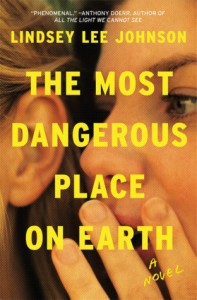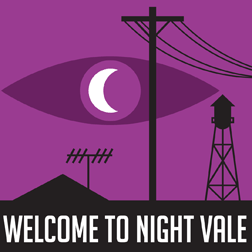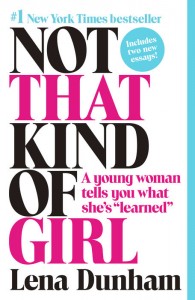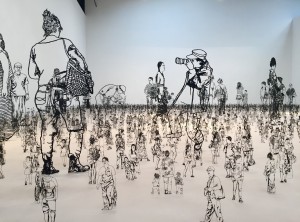
What should I read next? It’s a question we all ask ourselves time and again. Even with the countless essays, novels, screenplays, poems, and transmedia pieces to discover, to fall in love with or to detest, it can be a challenge to choose. Enter Expo Recommends, a curated selection of readings brought to you by the editors of Exposition Review.
This month, to honor our new “Surface” issue, some of the Expo editors got together to give some #ExpoRecommends inspired by the “Surface” theme. As expected, the run the gamut of genres and include fiction, nonfiction, a podcast, and art.
The Most Dangerous Place on Earth by Lindsey Lee Johnson (Fiction recommended by Annlee Ellingson)
 It’s a relief, isn’t it, to read a friend’s work and find that it’s good? Thrilling to find that it’s great.
It’s a relief, isn’t it, to read a friend’s work and find that it’s good? Thrilling to find that it’s great.
Such is the case with Lindsey Lee Johnson, an MPW alum, former Southern California Review editor, and pal who published her debut novel The Most Dangerous Place on Earth earlier this year.
Inspired by her years as a tutor and set in her hometown of Marin County in Northern California, the book cycles through the points of view of a handful of high schoolers, each a stereotype in the wealthy, largely white enclave—the jock, the party girl, the druggie, etc. Each marked by the suicide of a junior-high classmate who’d been the victim of cyberbullying. Their cyberbullying.
Johnson digs beneath the surface of these privileged kids to expose their secrets, insecurities, and vulnerabilities with nuanced emotional insight and achingly beautiful language, like this:
“Turning to his left, he saw the red-orange spires of the Golden Gate Bridge, like masts of an enormous ship, like skyscraper of an alien nation, like ladders to the sky. His heart beat frantically in his ears. Yet for the first time in a long time, he felt like he could breathe.”
Welcome to Night Vale (Podcast recommended by Laura Rensing)
 What would you get if you crossed The Twilight Zone with a Salvador Dalí painting? You’d probably end up with something like Welcome to Night Vale, a long-form serial fiction podcast told in the style of a local radio show. Though each episode can stand on its own, the longer you stay in Night Vale, the more you uncover the weird world underneath. Taken at (sur)face value, the podcast is a whimsical collection of fictional advertisements, safety announcements from the Sheriff’s secret police, and “news” stories, but it is up to the listener to follow the breadcrumbs and decide how deep the conspiracies of Night Vale reach. The subtle storytelling feels oddly reminiscent of a Mad Men episode where every detail quietly reveals a dark underbelly—but only if you pay very close attention.
What would you get if you crossed The Twilight Zone with a Salvador Dalí painting? You’d probably end up with something like Welcome to Night Vale, a long-form serial fiction podcast told in the style of a local radio show. Though each episode can stand on its own, the longer you stay in Night Vale, the more you uncover the weird world underneath. Taken at (sur)face value, the podcast is a whimsical collection of fictional advertisements, safety announcements from the Sheriff’s secret police, and “news” stories, but it is up to the listener to follow the breadcrumbs and decide how deep the conspiracies of Night Vale reach. The subtle storytelling feels oddly reminiscent of a Mad Men episode where every detail quietly reveals a dark underbelly—but only if you pay very close attention.
I will admit that I wasn’t a huge fan of the deadpan style and absurdism when I listened to the first episode, but the more I listened, the more I enjoyed the subtle throughlines and running jokes of the podcast. Like Night Vale itself, the podcast is full of delightful—and terrifying—surprises. It has been successful enough to spawn several well-received novels, spinoff podcasts, and numerous fan fiction mashups. Welcome to Night Vale is the next evolution in oral storytelling—a very rare thing in a world where we can carry TV screens in our back pockets.
Not That Kind of Girl by Lena Dunham (Nonfiction recommended by Lauren Gorski)
 Lena Dunham’s nonfiction collection of essays is a beautiful work of humor and reflection all about Dunham’s rise into adulthood. What strikes me most about each piece is how strongly Dunham’s voice comes through—even in the moments when she is just listing the emails she wished she would have sent in her life. The reason a work like this reminds me of our own “Surface” nonfiction (seriously, Maryann Aita might be Lena Dunham’s soul sister…), is that Dunham has shaped a life around more than just one singular thing. Becoming an adult isn’t just getting your dream job and settling into a long term romance—it’s all the relationships in your life that matter. The friends. The work buddies. Even how you feel in your body. All of these elements grow and change and eventually, you’ll be comfortable with the fact that there’s no way to predict what happens next.
Lena Dunham’s nonfiction collection of essays is a beautiful work of humor and reflection all about Dunham’s rise into adulthood. What strikes me most about each piece is how strongly Dunham’s voice comes through—even in the moments when she is just listing the emails she wished she would have sent in her life. The reason a work like this reminds me of our own “Surface” nonfiction (seriously, Maryann Aita might be Lena Dunham’s soul sister…), is that Dunham has shaped a life around more than just one singular thing. Becoming an adult isn’t just getting your dream job and settling into a long term romance—it’s all the relationships in your life that matter. The friends. The work buddies. Even how you feel in your body. All of these elements grow and change and eventually, you’ll be comfortable with the fact that there’s no way to predict what happens next.
People I Saw but Never Met by Zadok Ben-David (Art recommended by Brianna J.L. Smyk)
 At Shoshana Wayne Gallery, Zadok Ben-David’s People I Saw but Never Met (on view through May 27) blankets the surface of the gallery. Over 3,000 renderings of global citizens who were seen, photographed, and sketched by the artist in candid positions—a combination of smaller chemically etched figures and forty-five larger hand-cut aluminum figures—populate the entire floor. The two-dimensional figures question our ability to get beneath the surface of the strangers we pass on the street (or in LA, in our cars) every day. We see them moving through their own worlds, sometimes striking compelling poses or wearing interesting outfits that perhaps remain in our minds for a moment or a day, or less often, imprint themselves into our longterm memory. But even if we do remember these fellow humans, what do we know about them beyond the way they present themselves to the outside world? Are they transparent and one dimensional like Ben-David’s artworks, or, more likely, do they have a depth we can’t observe in a single moment from our distance?
At Shoshana Wayne Gallery, Zadok Ben-David’s People I Saw but Never Met (on view through May 27) blankets the surface of the gallery. Over 3,000 renderings of global citizens who were seen, photographed, and sketched by the artist in candid positions—a combination of smaller chemically etched figures and forty-five larger hand-cut aluminum figures—populate the entire floor. The two-dimensional figures question our ability to get beneath the surface of the strangers we pass on the street (or in LA, in our cars) every day. We see them moving through their own worlds, sometimes striking compelling poses or wearing interesting outfits that perhaps remain in our minds for a moment or a day, or less often, imprint themselves into our longterm memory. But even if we do remember these fellow humans, what do we know about them beyond the way they present themselves to the outside world? Are they transparent and one dimensional like Ben-David’s artworks, or, more likely, do they have a depth we can’t observe in a single moment from our distance?
This distance from our chance encounters is paralleled in the presentation. We, the viewers, cannot penetrate the line that divides us from the figures, who are frozen on their stage-like setting. We can see and study the people in the foreground, but those in the back remain something of an enigma. We can’t make out their details, and they almost fade to the background of the gallery as so many people fade to the backs of our memories. The entire piece seems to be a call to look beneath the surface, to interact rather than just encounter, to push the boundaries of what it means to “see” someone.
[…] Find the rest of the recommendations on the Expo blog. […]